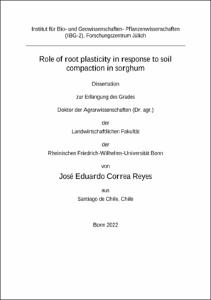Correa Reyes, José Eduardo: Role of root plasticity in response to soil compaction in sorghum. - Bonn, 2022. - Dissertation, Rheinische Friedrich-Wilhelms-Universität Bonn.
Online-Ausgabe in bonndoc: https://nbn-resolving.org/urn:nbn:de:hbz:5-66718
Online-Ausgabe in bonndoc: https://nbn-resolving.org/urn:nbn:de:hbz:5-66718
@phdthesis{handle:20.500.11811/9876,
urn: https://nbn-resolving.org/urn:nbn:de:hbz:5-66718,
author = {{José Eduardo Correa Reyes}},
title = {Role of root plasticity in response to soil compaction in sorghum},
school = {Rheinische Friedrich-Wilhelms-Universität Bonn},
year = 2022,
month = jun,
note = {Compacted soils limit crop production and affect millions of hectares of agricultural land globally. Plants vary in tolerance to soil compaction and roots express various plastic responses. Unfortunately, the importance of those responses for crop yield and the implication in breeding are practically unknown. Accordingly, to test whether the plasticity of the root system architecture is associated with the tolerance to soil compaction, we reviewed the various root responses reported in the literature and describe the consequences of soil compaction on the rooting environment. Additionally, we carried out a set of experiments to study the phenotypic diversity of shoot and root plasticity in a collection of sorghum genotypes. For that, plants were grown in a greenhouse for three to six weeks in homo- and heterogeneous soil density gradients (from 1.3 to 1.8 g cm-3). Finally, a simulation-based research was conducted to study the plants functional consequence of phenotypic response to soil compaction. As a conclusion, sorghum genotypes can vary significantly in terms of their response to soil compaction. Tolerant lines are in general smaller sized genotypes which exhibit plasticity to soil compaction for fine roots only. Additionally, this tolerance is associated with the ability to compensate the limited function of an impeded portion of their root system, by growing less roots in those layers where the strength is high and growing more roots in looser zones. Although these responses are complex, root plasticity can be targeted in breeding to increase the crop yield under specific conditions such as low-input agronomic systems.},
url = {https://hdl.handle.net/20.500.11811/9876}
}
urn: https://nbn-resolving.org/urn:nbn:de:hbz:5-66718,
author = {{José Eduardo Correa Reyes}},
title = {Role of root plasticity in response to soil compaction in sorghum},
school = {Rheinische Friedrich-Wilhelms-Universität Bonn},
year = 2022,
month = jun,
note = {Compacted soils limit crop production and affect millions of hectares of agricultural land globally. Plants vary in tolerance to soil compaction and roots express various plastic responses. Unfortunately, the importance of those responses for crop yield and the implication in breeding are practically unknown. Accordingly, to test whether the plasticity of the root system architecture is associated with the tolerance to soil compaction, we reviewed the various root responses reported in the literature and describe the consequences of soil compaction on the rooting environment. Additionally, we carried out a set of experiments to study the phenotypic diversity of shoot and root plasticity in a collection of sorghum genotypes. For that, plants were grown in a greenhouse for three to six weeks in homo- and heterogeneous soil density gradients (from 1.3 to 1.8 g cm-3). Finally, a simulation-based research was conducted to study the plants functional consequence of phenotypic response to soil compaction. As a conclusion, sorghum genotypes can vary significantly in terms of their response to soil compaction. Tolerant lines are in general smaller sized genotypes which exhibit plasticity to soil compaction for fine roots only. Additionally, this tolerance is associated with the ability to compensate the limited function of an impeded portion of their root system, by growing less roots in those layers where the strength is high and growing more roots in looser zones. Although these responses are complex, root plasticity can be targeted in breeding to increase the crop yield under specific conditions such as low-input agronomic systems.},
url = {https://hdl.handle.net/20.500.11811/9876}
}






